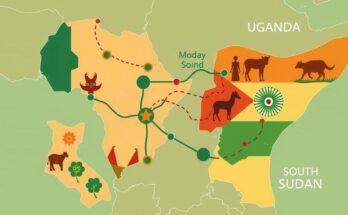The M23 armed group, backed by Rwanda, has announced a ceasefire in the DRC due to humanitarian concerns following their seizure of Goma. The ceasefire, effective February 4, 2025, aims to protect civilians amidst significant loss of life and displacement caused by the conflict. A regional summit is forthcoming, which may address peace negotiations between the parties involved.
The M23 rebel group, reportedly supported by Rwanda, has announced a unilateral ceasefire in the Democratic Republic of the Congo (DRC) to address the ongoing humanitarian crisis. The ceasefire, set to take effect on February 4, 2025, comes after the rebels captured Goma, the capital of eastern DRC, last week. Following this advance, the United Nations has reported that approximately 900 individuals have been killed, with hundreds of thousands displaced as a result of the conflict.
In their statement made on X, the Alliance Fleuve Congo (AFC/M23) remarked that the ceasefire was a response to the humanitarian situation instigated by the Kinshasa regime. The rebels assert they do not intend to initiate any new assaults on Bukavu or other strategic locations. M23 spokesman Lawrence Kanyuka emphasized their commitment to the protection of civilian populations and reaffirmed their positions without further aggression.
The declaration of a ceasefire precedes a regional summit anticipated at the weekend, where leaders from Congo and Rwanda might convene to discuss peace negotiations. Efforts to broker peace previously have been unsuccessful, though the involvement of Kenyan officials suggests a potential opening for dialogue. Meanwhile, G7 foreign ministers have urged all parties to engage in constructive negotiations and ensure humanitarian relief can be delivered without hindrance.
The enduring conflict in the DRC has roots in ethnic tensions, particularly regarding the protection of ethnic Tutsis who migrated after the 1994 Rwandan genocide. The DRC government alleges that Rwandan-supported forces have been exploiting the country’s wealth, which includes crucial rare earth minerals. The humanitarian situation remains dire, with significant numbers of individuals affected and requiring urgent assistance.
The M23 rebels are part of a prolonged conflict in the Democratic Republic of the Congo, which has historical roots in ethnic strife and the aftermath of the Rwandan genocide. The group, which is heavily backed by Rwanda, has been implicated in both military aggression and the looting of DRC’s vast mineral resources. The situation has led to severe humanitarian crises, necessitating urgent international attention and intervention. Current negotiations and ceasefires attempt to alleviate the humanitarian impact while addressing the underlying tensions between ethnic groups involved in the conflict.
The M23 rebels have declared a ceasefire in the midst of a severe humanitarian crisis following their recent territorial gains in eastern DRC. This development creates a potential avenue for peace talks between DRC and Rwandan leaders. Nonetheless, the persistent issues of ethnic conflict and resource exploitation remain prominent, necessitating commitment from all parties to work towards sustainable peace and humanitarian aid.
Original Source: www.aljazeera.com




